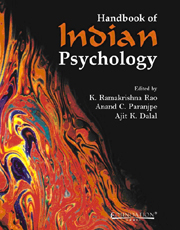Book contents
- Frontmatter
- Contents
- Contributing Authors
- Preface
- 01 Prologue: Introducing Indian Psychology
- 02 Indian Thought and Tradition: A Psychohistorical Perspective
- PART I SYSTEMS AND SCHOOLS
- PART II TOPICS AND THEMES
- 16 Indian Theories of Perception: An Inter-School Dialogue from Buddhist Perspective
- 17 Indian Psychology of Motivation
- 18 Personality in Indian Psychology
- 19 “Giving” as a Theme in the Indian Psychology of Values
- 20 The Making of a Creative Poet: Insights from Indian Aestheticians
- 21 Anchoring Cognition, Emotion and Behaviour in Desire: A Model from the Bhagavad-Gītā
- 22 Consciousness
- 23 J. Krishnamurti: Freedom from Knowledge
- PART III APPLICATIONS AND IMPLICATIONS
- Pronunciation and Transliteration of Sanskrit Alphabet
- Glossary
- Index
23 - J. Krishnamurti: Freedom from Knowledge
from PART II - TOPICS AND THEMES
Published online by Cambridge University Press: 26 October 2011
- Frontmatter
- Contents
- Contributing Authors
- Preface
- 01 Prologue: Introducing Indian Psychology
- 02 Indian Thought and Tradition: A Psychohistorical Perspective
- PART I SYSTEMS AND SCHOOLS
- PART II TOPICS AND THEMES
- 16 Indian Theories of Perception: An Inter-School Dialogue from Buddhist Perspective
- 17 Indian Psychology of Motivation
- 18 Personality in Indian Psychology
- 19 “Giving” as a Theme in the Indian Psychology of Values
- 20 The Making of a Creative Poet: Insights from Indian Aestheticians
- 21 Anchoring Cognition, Emotion and Behaviour in Desire: A Model from the Bhagavad-Gītā
- 22 Consciousness
- 23 J. Krishnamurti: Freedom from Knowledge
- PART III APPLICATIONS AND IMPLICATIONS
- Pronunciation and Transliteration of Sanskrit Alphabet
- Glossary
- Index
Summary
Profile of J. Krishnamurti
J. Krishnamurti was born to Sanjeevamma and Jiddu Narinaiah in Madanapalli in Andhra Pradesh, South India. He was “discovered” in his boyhood (1909) by Bishop Leadbeater and brought up by Mrs Annie Besant, the leader of the Theosophical Society, who proclaimed that he was the world teacher that the theosophists were waiting for. Krishnamurti had certain mystical experiences, which led to his transformation and a new vision of life. He dissociated himself from all organized religions, giving a new meaning and content to religion. From the 1920's until 1986, he traveled around the world giving talks, writing, holding dialogues, or sitting silently when people sought his compassionate and healing presence. Many regard him as one who has had a profound impact on human consciousness in modern times. His teachings are universal as they relate to everyday life, to the depths and heights of human mind and the timeless. They inspire a quest for truth and for the sacred in modern man.
Introduction
Krishnamurti finds the significance of life in living with the understanding of its wider and deeper issues. To him the most significant in such understanding, but yet missing, is selfknowing. To him, the ignorant man is not the illiterate man, but one who is not self-knowing. His whole concern is in directing humanity towards such understanding. He takes us into an inward journey into ourselves. He feels that the actual righteous foundation must be laid in daily living by finding how we behave, think, feel, and act in our relationships. He touches upon the contents of consciousness both at the conscious and unconscious levels.
- Type
- Chapter
- Information
- Handbook of Indian Psychology , pp. 429 - 446Publisher: Foundation BooksPrint publication year: 2008

